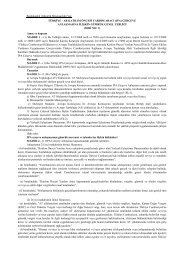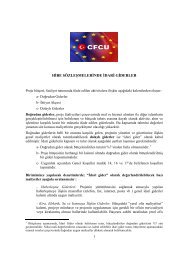Project Cycle Management Training Handbook - CFCU
Project Cycle Management Training Handbook - CFCU
Project Cycle Management Training Handbook - CFCU
You also want an ePaper? Increase the reach of your titles
YUMPU automatically turns print PDFs into web optimized ePapers that Google loves.
6<br />
<strong>Project</strong> <strong>Cycle</strong> <strong>Management</strong> <strong>Training</strong> <strong>Handbook</strong><br />
Chapter 2: <strong>Project</strong> <strong>Cycle</strong> <strong>Management</strong><br />
Structured &<br />
informed<br />
decision-making<br />
This Chapter introduces the project cycle, describes its phases and<br />
explains its role in aid management. It presents an overview of the<br />
rationale and principles of <strong>Project</strong> <strong>Cycle</strong> <strong>Management</strong>, and a brief<br />
description of how the project cycle operates within DGIB.<br />
2.1 The <strong>Project</strong> <strong>Cycle</strong><br />
The way in which projects are planned and carried out follows a<br />
sequence that has become known as the project cycle. The cycle starts<br />
with the identification of an<br />
idea and develops that idea<br />
Figure 3: The <strong>Project</strong> <strong>Cycle</strong><br />
into a working plan that can be<br />
implemented and evaluated.<br />
Ideas are identified in the<br />
Programming<br />
context of an agreed strategy.<br />
It provides a structure to<br />
ensure that stakeholders are<br />
Evaluation<br />
Identification<br />
consulted and relevant Implementation<br />
Formulation<br />
information is available, so<br />
that informed decisions can be<br />
made at key stages in the life<br />
of a project.<br />
Financing<br />
The generic project cycle has six phases: Programming;<br />
Identification; Formulation; Financing; Implementation; and<br />
Evaluation. The details of what occurs during each phase differ<br />
between institutions, reflecting differences in procedures. However,<br />
within all institutions the cycle shares three common themes:<br />
1. The cycle defines the key decisions, information requirements and<br />
responsibilities at each phase.<br />
2. The phases in the cycle are progressive – each phase needs to be<br />
completed for the next to be tackled with success.<br />
Add your own notes here…





